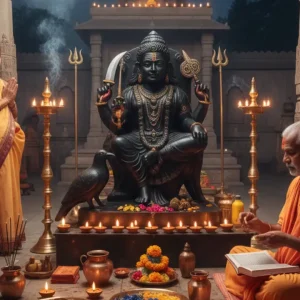The Hindu calendar is rich with months that hold spiritual and cultural significance, but none stand out as prominently as Shravan. Often described as the holiest month, Shravan is a time of deep devotion, rituals, and festivals that connect millions of Hindus to their faith and traditions. Let’s dive into the essence of this sacred month and understand why it holds such a special place in the hearts of devotees.
What Makes Shravan Special?
Shravan, the fifth month of the Hindu lunar calendar, typically falls between July and August. The month is named after the star “Shravana” which is believed to be significant in Hindu astrology. What makes Shravan unique is its strong association with Lord Shiva. Devotees believe that during this time, the cosmic energy is particularly favorable for spiritual practices and penance.
Significance of Shravan Mondays
Mondays in Shravan, known as Shravan Somvar, are particularly auspicious for worshipping Lord Shiva. Devotees observe fasts, perform special prayers, and visit Shiva temples. The belief is that these practices can cleanse one’s sins and bring blessings. The legend of Samudra Manthan, where Shiva drank poison to save the universe, is often recounted during this period, emphasizing his role as a protector and benefactor.
Rituals and Practices
Fasting
Fasting is a central aspect of Shravan. Devotees follow different fasting rules, ranging from consuming only fruits and milk to complete abstinence from food and water. The idea is to purify the body and mind, making it a vessel for divine energy.
Abhishekam
Abhishekam, the ritual bathing of Shiva Lingam with milk, honey, water, and other sacred substances, is widely performed. This act symbolizes the purification and appeasement of Lord Shiva, and it is believed to invoke his blessings for health, wealth, and prosperity.
Rudrabhishek
Rudrabhishek is a more elaborate form of Abhishekam, where Vedic hymns, especially the Rudra Chamakam and Rudra Namakam, are chanted. This powerful ritual is said to remove negative energies and fulfill the wishes of the devotees.
Festivals During Shravan
Nag Panchami
Nag Panchami, celebrated on the fifth day of Shravan, is dedicated to the worship of snakes, which are considered sacred in Hinduism. Devotees offer milk to snake idols and visit temples to pray for protection from snake bites and other harms.
Raksha Bandhan
Raksha Bandhan, also known as Rakhi, is a significant festival that falls in Shravan. It celebrates the bond between brothers and sisters. Sisters tie a protective thread (rakhi) around their brothers’ wrists, praying for their well-being, while brothers vow to protect their sisters.
Janmashtami
Janmashtami marks the birth of Lord Krishna, an avatar of Vishnu. Celebrated with great fervor, especially in regions like Mathura and Vrindavan, it involves fasting, night vigils, and reenactments of Krishna’s childhood exploits.
Personal Stories of Devotion
In the small town of Varanasi, 65-year-old Meera Devi has observed Shravan fasts for the past 40 years. Despite her age, she walks to the Kashi Vishwanath Temple every Monday, carrying a pot of Ganga water for Abhishekam. Meera believes that her unwavering devotion has brought her family peace and prosperity.
Similarly, Ramesh, a young software engineer in Bangalore, balances his demanding job with his religious duties. He wakes up early to perform Rudrabhishek at home before heading to work. For him, these rituals are a way to stay connected to his roots and find solace in the hectic modern life.
Health and Spiritual Benefits
The fasting and rituals of Shravan are not just about religious observance; they also have significant health and spiritual benefits. Fasting helps in detoxifying the body and improving digestion. The early morning prayers and meditations create a serene start to the day, reducing stress and enhancing mental clarity.
The Environmental Connection
Shravan coincides with the monsoon season in India. This period of renewal and growth in nature mirrors the spiritual renewal that devotees seek. The increased water availability also facilitates rituals like Abhishekam, where large quantities of water and milk are used.
How to Observe Shravan in Modern Times
In today’s fast-paced world, observing Shravan might seem challenging, but it is possible to integrate its practices into a modern lifestyle. Here are some tips:
Plan Ahead: Mark the important dates on your calendar and plan your work and personal commitments around them.
Simplify Fasting: Choose a fasting method that suits your health and lifestyle. Even a simple fruit and milk fast can be beneficial.
Create a Sacred Space: Dedicate a small corner in your home for daily prayers and rituals.
Digital Detox: Use this time to reduce screen time and engage in reading spiritual texts or listening to devotional music.
Community Participation: Join local temple activities or online communities to stay motivated and connected.
Embrace the Sacredness of Shravan
Shravan is not just a month on the calendar; it’s a time to deepen your spiritual practices, connect with the divine, and rejuvenate your soul. Whether you observe the fasts strictly or incorporate small rituals into your daily routine, the essence of Shravan lies in the sincerity of your devotion.
How do you observe Shravan? Share your experiences and tips in the comments below. Let’s learn and grow together in our spiritual journeys.





